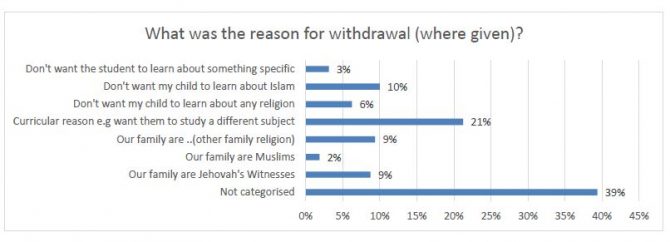Schools are failing to meet their legal obligations to teach religious education (RE), a new poll from the National Association of Teachers of Religious Education (NATRE) has found.
Schools in England are legally required to teach RE, but NATRE found there were a number of challenges which meant pupils were not getting access to the education they need. Here are five key findings from the survey.
1. Parents pulling kids from class
Nearly a third – 31.7 per cent – of respondents said they parents had withdrawn their children from RE in their school.
Of those who had a reason for the withdrawal, 21 per cent cited curricular reasons, such as wanting their child to spend more time on a different subject.
Ten per cent said they did not want their children learning about Islam and six per cent did not want their child to learn about any religion.
Nine per cent said they wanted to opt out because their family were Jehovah’s Witnesses and two per cent because their family were Muslim.
Maintained schools saw more reluctance among parents, with 42.6 per cent of respondents saying they had experienced parents withdrawing pupils from religious education in their school, compared to 33.5 per cent of academies without a religious character.

2. Teachers teach other subjects
Three quarters of respondents said that RE was taught in their school by teachers who spend most of their timetable teaching another subject.
In 36 per cent of cases, more than one in five lessons is taught by teachers who usually teach another subject. Respondents cited a lack of RE specialists as the reason.
“Even though the government finally reintroduced bursaries for teachers training in 2018-19 to teach RE, these bursaries were significantly below the value offered to those training to teach other subjects.”
3. Academies aren’t as good at meeting their obligations
Fifty per cent of respondents from academies said their school did not meet their legal or contractual requirements to teach RE, compared to 40.3 per cent of those working in maintained schools.
The situation in academies is similar when compared with 2015-16 data, which was also at 50 per cent, but maintained schools has seen a rise from 34 per cent.
4. A decrease in the amount of teaching in RE
Nearly a quarter – 24 per cent – of respondents said there was a decrease in the amount of teaching in the subject in 2018-19 compared to 2017-18.
Meanwhile, 18 per cent said there had been an increase.
There has also been a decrease in the number of specialist staff, the survey found. Twenty-eight per cent of respondents said there had been a reduction in the numbers of subject specialist staff in 2018-19, while 13 per cent had witnessed and increase. There remainder saw no change.
5. Most year 11 and year 10 students aren’t taught any RE
Sixty-four per cent of teachers reported that year 11 pupils at their school did not receive any RE teaching. The figure was 59 per cent for year 10. RE is an optional subject at key stage 4.
Ben Wood, NATRE chair, said: “RE is a vital part of the curriculum, giving pupils the chance to learn about the people in the world around them and providing them with the opportunity to discuss and debate important questions.
“To deny pupils this chance means pupils are missing a crucial part of their learning, something every pupil in every school is entitled to receive.”







The solution is not to teach RE. Most countries in the world forbid it by law.
In my headship school in Barrow-in-Furness from 1989-2003, we had 1 x HMI & 2 x OfSTED inspections and never taught RE. There was a unit on comparative religion in the KS4 Integrated Humanities GCSE course. None of the (all good) Inspection Reports made any mention of RE, although the Integrated Humanities course was much praised.
Just noting that in Finland religious education is a mandatory subject from when children start school at 7 all the way until 19.
I’m also intrigued by your definitive statement that most countries in the world forbid teaching RE by law.
I confess to not knowing what the position is in China, North Korea, Saudi Arabia etc. but I would have been very surprised if most countries that have a comparable education system to our own had passed laws absolutely banning the teaching of RE.
I had a quick look at Europe. France doesn’t generally fund RE (except in Alsace and Moselle where it does), but it doesn’t ban it. The only European country I could find which does forbid the teaching of RE is Sweden.
The USA is another example where RE is not taught in schools, but that’s only two.
I’d be grateful if you could point me in the direction of the source for your statement …
Teaching children and young people about major religions is essential for understanding. This is not the same as proselytizing which promotes only one faith. Neither is it the same as worship, collective or otherwise.
Not to educate children and young people about religious thought is to perpetuate ignorance and misunderstanding. Being taught about religions is not the same as being expected to believe in one of them.
Couldn’t agree more.
What I’m not sure about though is parental choice in this context. My default position is that parents have the right to make decisions for their young children. However I can’t help feeling that those children who are pulled out of RE classes because their parents don’t want them to learn about Islam, Christianity etc are precisely the children that need to be in those classes.